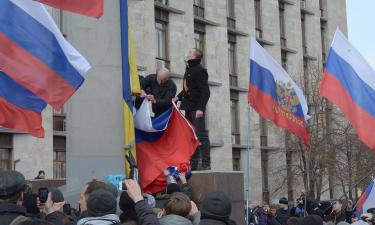Students: a Nation
 Students are a nation. Today this nation has a legitimate reason to party all night long, as it is on the 17th of November they celebrate an International Student day.
Students are a nation. Today this nation has a legitimate reason to party all night long, as it is on the 17th of November they celebrate an International Student day.
The roots
The birth of the higher education in Russia is dated back to Peter the First. In the XVIII century Academic university, Medical academy and Mountain college were established in Petersburg, and "The First Classical University and Slavic-Greek-Latin Academy" was created in Moscow.
In studying and daily life students had to obey the written order, and heavy monetary and non-monetary sanctions (like dressing in peasant clothes) were in place. The best students received military ranks faster. First stipendiums appeared. Most students had to work somewhere, and the best source of revenue for them were translations from foreign languages.
A degree could be received in 3 to 4 years. By the end of the XVIII century there were 12 universities in Russian Empire: seven in Saint-Petersburg, three in Moscow and one for both Kazan and Kiev.
A rapid growth in prestige of higher education was observed in 1897-1908, and from 1914 a number of engineering students increased.
Girls could not attend university. The majority of students constituted of tradesmen families (35.2%), peasants (22%) and nobles (9.8%)
All the folk is having fun
Nowadays the Students' Day joins together all the various faculties and universities. Students forget about the coming exams and party to death.
As it is a professional holiday, so to say, the best place to celebrate it is obviously on campus, an infamous Russian "obschaga". A way too many people pack into small rooms, and party until being put out by the guards. Most problems arise with toilets (which never function as they should, and guests are likely to have problems!) and kitchens (food and things disappear into neighbor’s room). Also, when "obschaga" is closed for the night, the "mousetrap is closed", and those who want to go home should think ahead, or look for a place to hide from the night guards.
Whatever was the hour they went to bed, the morning calls back to alma mater. Maybe only a half of students do come in fact, but their blank eyes and not so pleasant smell, together with a nearly innocent with to keep themselves in hands, charms lecturers who usually let them go early.
Their tastes
Our students normally do not like quietness of Student day abroad.
In Belgium, for example, small companies of 7-8 old friends gather in bars mostly. Picnics are rare between students. Belgians do not really like singing (in opposite to our students), even though do not mind listening to modern music.
Danish students celebrate holidays in the closest circle of best friends. During the daytime they gather in someone’s house, joke and sing (sometimes playing guitar, what Russians love so much) and then in the evening go to a pub. They prefer beer, trying to make a holiday a nice funny day.
Americans love freedom in everything. That is probably why the US students like to celebrate holidays with friends or boy/girlfriends on a picnic out of cities. On the other hand, many of them prefer expensive nightclubs or restaurants, as most of the students in the States come from rich families. So where and how to celebrate is not a problem for them, and the key thing they struggle to is doing what they really like.
Russian students also celebrate their day on the 25th of November. And they obey all those well-known traditions of Russian celebrations, when every minute is lived like the last day. In this day all, even the shy, quiet ones become organic parts of the company. Funny draws, anecdotes, endless jokes and inevitable songs by guitar go all day long. Only teachers do not want to discover all the hidden talents that shine out on these days (because they are absent on the parties!), but who cares about them when you have so many same-minded friends who support you with all their souls' warmth?
Subscribe to Pravda.Ru Telegram channel, Facebook, RSS!



